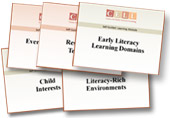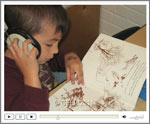Resources for CELL Training
Powerpoint for CELL Training
Evidence-Based Practices for Promoting the Literacy Development of Infants, Toddlers, and Preschoolers (classroom-based)For those training or providing technical assistance to the classroom teacher or the Home Visitor, each PowerPoint introduces and illustrates the components of the CELL Early Literacy Learning Model. Included are practices, questions for evaluating the practices, overview of the literacy domains and checklists for reflection
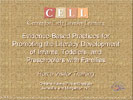
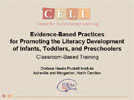
User Guide for Classroom Based Programs
The main intent of the User Guide for Classroom Based Programs is to provide a step-by-step “how-to” for the adoption and sustained use of CELL within a classroom based program and using the resources available on the CELL websiteDownload***
Self-Guided Learning Modules
Our goal is to share with you information about each CELL component, including a definition, why it is important, and how to use within a classroom setting or home to promote children’s early literacy learning.Powerpoint for Adaptations
Evidence-Based Practices for Promoting Literacy Development of Infants, Toddlers, and Preschoolers: Adaptations for Children with DisabilitiesBased on the CELL Early Literacy Learning Model, a trainer or technical assistance provider can utilize this PowerPoint to introduce and illustrate a continuum of adaptations. Opportunities for the practitioner to practice, evaluate, and reflect on the implementation of adaptations are provided.
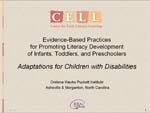
Getting Kids Involved:
Creating Opportunities for Learning video*
This video introduces and illustrates many ways that adaptations can be used to promote the active participation of infants, toddlers, and preschoolers in everyday literacy activities. You will see examples of adaptations in home and classroom environments, activities, materials, and/or instructions.Additional Skill-Building Exercises
The Additional Skill-Building Exercises provide early childhood home visitors, early interventionists and classroom-based staff with follow-up support in utilizing the CELL Early Literacy Learning Model. The exercises provide the home visitor and classroom practitioner with opportunities to practice, evaluate, and reflect about an early literacy learning practice. The intent is to take these practice activities into the home, classroom and community to create an authentic, hands-on experience utilizing the components of the CELL model.
Children’s Interest-Based Learning - Classroom***
Children’s Interest-Based Learning - Home-based***
Everyday Literacy Activities - Classroom***
Everyday Literacy Activities - Home-based***
Literacy-Rich Environments - Classroom***
Literacy-Rich Environments - Home-based***
Responsive Teaching - Classroom***
Responsive Teaching - Home-based***
Children’s Interest-Based Learning - Home-based***
Everyday Literacy Activities - Classroom***
Everyday Literacy Activities - Home-based***
Literacy-Rich Environments - Classroom***
Literacy-Rich Environments - Home-based***
Responsive Teaching - Classroom***
Responsive Teaching - Home-based***
* Requires Javascript to be enabled and the Flash Player. Download Flash™ You may want to uncheck the Google Tool bar option.
** Requires the Microsoft PowerPoint Viewer®. Download PowerPoint Viewer.
*** Requires the latest version of the Adobe Reader®. Download Adobe Reader® You may want to uncheck the Google Tool bar option.
** Requires the Microsoft PowerPoint Viewer®. Download PowerPoint Viewer.
*** Requires the latest version of the Adobe Reader®. Download Adobe Reader® You may want to uncheck the Google Tool bar option.


